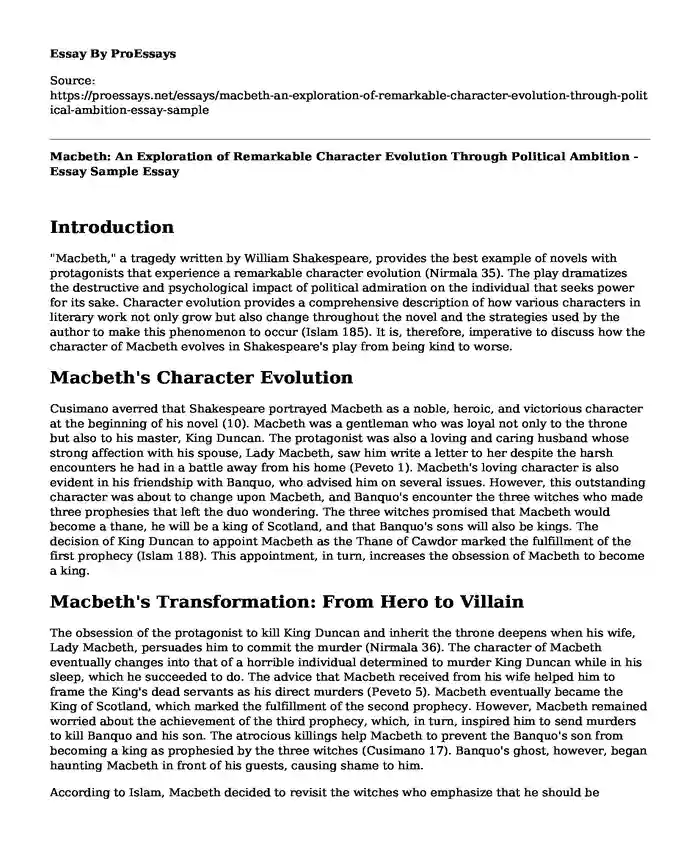Introduction
"Macbeth," a tragedy written by William Shakespeare, provides the best example of novels with protagonists that experience a remarkable character evolution (Nirmala 35). The play dramatizes the destructive and psychological impact of political admiration on the individual that seeks power for its sake. Character evolution provides a comprehensive description of how various characters in literary work not only grow but also change throughout the novel and the strategies used by the author to make this phenomenon to occur (Islam 185). It is, therefore, imperative to discuss how the character of Macbeth evolves in Shakespeare's play from being kind to worse.
Macbeth's Character Evolution
Cusimano averred that Shakespeare portrayed Macbeth as a noble, heroic, and victorious character at the beginning of his novel (10). Macbeth was a gentleman who was loyal not only to the throne but also to his master, King Duncan. The protagonist was also a loving and caring husband whose strong affection with his spouse, Lady Macbeth, saw him write a letter to her despite the harsh encounters he had in a battle away from his home (Peveto 1). Macbeth's loving character is also evident in his friendship with Banquo, who advised him on several issues. However, this outstanding character was about to change upon Macbeth, and Banquo's encounter the three witches who made three prophesies that left the duo wondering. The three witches promised that Macbeth would become a thane, he will be a king of Scotland, and that Banquo's sons will also be kings. The decision of King Duncan to appoint Macbeth as the Thane of Cawdor marked the fulfillment of the first prophecy (Islam 188). This appointment, in turn, increases the obsession of Macbeth to become a king.
Macbeth's Transformation: From Hero to Villain
The obsession of the protagonist to kill King Duncan and inherit the throne deepens when his wife, Lady Macbeth, persuades him to commit the murder (Nirmala 36). The character of Macbeth eventually changes into that of a horrible individual determined to murder King Duncan while in his sleep, which he succeeded to do. The advice that Macbeth received from his wife helped him to frame the King's dead servants as his direct murders (Peveto 5). Macbeth eventually became the King of Scotland, which marked the fulfillment of the second prophecy. However, Macbeth remained worried about the achievement of the third prophecy, which, in turn, inspired him to send murders to kill Banquo and his son. The atrocious killings help Macbeth to prevent the Banquo's son from becoming a king as prophesied by the three witches (Cusimano 17). Banquo's ghost, however, began haunting Macbeth in front of his guests, causing shame to him.
According to Islam, Macbeth decided to revisit the witches who emphasize that he should be cautious of Macduff. The three witches insisted that no one could defeat Macbeth until Birnam Wood moves (190). Macbeth's return from the witches inspires him to kill Macduff's family. Macduff, in turn, convinces Malcolm, one of the deceased king's sons, to overthrow the kingdom of Macbeth (Nirmala 38). The two revolutionists arrived in Scotland with an army but decided to cut down branches of various trees in Birnam Wood to use as camouflage while executing their attack at Macbeth's castle. The incident of cutting the trees achieved the prophecy of the three witches because it accounted for the movement of the Birnam Wood (Cusimano 33). Finally, Macduff kills Macbeth to fulfill the last prophecy of the witches.
Conclusion
"Macbeth" provides the best example of exciting novels written by William Shakespeare. The play illustrates how character evolution can impact the life of a protagonist from a brave and honored soldier to a villain whose death occurs shamefully. Macbeth was one of the most admired soldiers in Scotland due to his heroic attributes and love for his friends, including Banquo, and his wife. However, Macbeth eventually turned into a horrifying figure who committed multiple murders to sustain his leadership that would later end in shame, as discussed in this paper.
Works Cited
Cusimano, Maria. Temptation, Sin, and the Human Condition in Shakespeare's Macbeth. University of New Orleans Theses and Dissertations, 2015, pp. 1-76, https://scholarworks.uno.edu/cgi/viewcontent.cgi?article=3091&context=td.
Islam, Saiful. Nature of Evil in Macbeth. The Arts Faculty Journal, 2011, pp. 185-194.
Nirmala, Petricia, A. Women characters as the manifestation of the 'other' of Macbeth: A psychological reading of Shakespeare's Macbeth. The Journal for English Language and Literary Studies, 2017, vol. 7, no. 1, pp. 35-38. http://www.tjells.com/article/651_33%20-%2038%20Petricia%20Alphine%20Nirmala.pdf.
Peveto, Jacqueline. Sounding and dressing the part: understanding Macbeth through language and costume. Conversations: A Graduate Student Journal of the Humanities, Social Sciences, and Theology, Vol. 2, No. 1, 2015, pp. 1-12, https://digitalcommons.acu.edu/cgi/viewcontent.cgi?article=1011&context=conversations.
Cite this page
Macbeth: An Exploration of Remarkable Character Evolution Through Political Ambition - Essay Sample. (2023, Mar 13). Retrieved from https://proessays.net/essays/macbeth-an-exploration-of-remarkable-character-evolution-through-political-ambition-essay-sample
If you are the original author of this essay and no longer wish to have it published on the ProEssays website, please click below to request its removal:
- 1984 by Orwell and Frankenstein Essay
- Comparison of Two Poems: An Athlete Dying Young and Ex-Basketball Player
- The Death of American Dream in the Great Gatsby - Essay Sample
- Essay Sample on The Puritan Culture as Portrayed in 'The Crucible'
- American Realism: A Faithful Representation of Reality - Essay Sample
- Essay Example on Chaucer on Women: Obedience & Virgin Mary
- Essay Sample on Character Evolution of Daenerys Targaryen in the Series "Game of Thrones"







